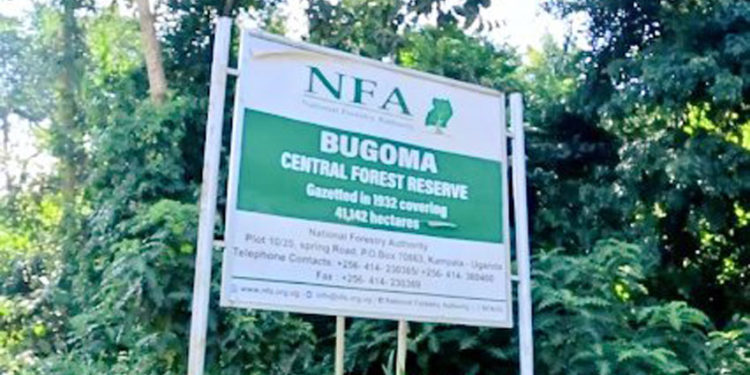Civil society organisations (CSOs) under the Save Bugoma Forest Campaign (SBFC) including the Africa Institute for Energy Governance (AFIEGO), National Association of Professional Environmentalists (NAPE), as well as Water and Environment Media Network (WEMNET) have withdrawn an appeal relating to Bugoma Central Forest Reserve from the Court of Appeal.
This decision arises from frustration with the prolonged litigation, which has allowed Hoima Sugar Limited (HSL) to continue destroying Bugoma Central Forest Reserve, rendering the subject matter of the appeal overtaken by events.
Further, while the case was filed with hopes that it would support efforts to stop the destruction of the Bugoma forest, its prolonged stay in the judicial system is affecting our other advocacy efforts, necessitating its withdrawal.
Case background
In August 2020, the National Environment Management Authority (NEMA) illegally issued an Environmental and Social Impact Assessment (ESIA) certificate of approval to HSL for its Kyangwali Mixed Land Use project.
The certificate permitted HSL to engage in activities such as sugarcane growing, urban development, and other potentially harmful operations in Bugoma forest.
In September 2020 therefore, the SBFC through AFIEGO, NAPE, and WEMNET filed a case at the High Court of Uganda seeking the cancellation of HSL’s ESIA certificate of approval. The CSOs argued that NEMA’s ESIA certificate of approval to HSL violated several provisions of Uganda’s environmental laws including:
Regulation 10 of the 1998 Environmental Impact Assessment (EIA) regulations which requires that an environmental impact study be conducted following the terms of reference developed in consultation with NEMA and the lead agency.
Regulation 12 of the 1998 EIA regulations which requires developers to consult with all potentially affected communities before conducting an ESIA, a requirement HSL failed to meet by only consulting one community out of the many surrounding Bugoma forest.
Regulation 19 necessitates that NEMA’s Executive Director invite the general public to comment on the environmental impact statement through a widely circulated newspaper, which was not done.
Regulations 21 and 22 require that the Executive Director of NEMA calls for public hearings for controversial projects or those that may have transboundary impacts and stipulate that the public hearings must follow specific procedures before a certificate of approval is issued. These regulations were ignored.
Despite presenting these and other arguments, the High Court with clear bias ruled against the CSOs on May 7, 2021, refusing to cancel HSL’s ESIA certificate. The High Court ruling left the Bugoma forest under destruction and the destruction is ongoing to date.
Following the High Court decision, AFIEGO, NAPE and WEMNET appealed to the Court of Appeal in May 2021, seeking to overturn the High Court’s decision. The CSOs requested the Court of Appeal to cancel HSL’s ESIA certificate of approval to stop the destruction of the Bugoma forest.
Since 2021 to date, AFIEGO and other appellants have continued to engage in relevant authorities including the Chief Justice, Deputy Chief Justice and other Ugandan government officials to expedite the hearing of the appeal to save Bugoma forest, but the efforts have been in vain.
As a result of the delays, HSL has continued to destroy the forest and has violated the conditions in its ESIA certificate of approval. This is evidenced by the September 2022 restoration order issued by NEMA to HSL through which NEMA indicated that HSL had destroyed the naturally reserved forest areas contrary to condition 4.3 in HSL’s ESIA certificate of approval.
The order also showed that “there was deforestation of the ecotourism site contrary to approval condition 4.3 (i)(c)”. NEMA also cancelled the permission it had earlier given to HSL to set up an urban centre in Bugoma forest.
Dickens Kamugisha, the SBFC chairperson, says, “Withdrawing our appeal from the Court of Appeal has been painful and difficult, but it is necessary. The courts in Uganda have demonstrated that they are unwilling to support forest conservation efforts due to the failure to hear and conclude cases. Having withdrawn the case, we will redirect our resources to other much-needed efforts to stop the ongoing destruction of Bugoma forest.”
Mr. Joshua Mutale of WEMNET adds, “We have withdrawn the appeal because the judiciary has failed in its duty of hearing cases without delays. Unfortunately, our judicial system remains insensitive and weak which has resulted in the worsening destruction of critical ecosystems such as forests, national parks, wetlands, lakes, rivers and others. This also explains the increasing cases of land grabbing, abuse of community rights, and Others.”
He however cautioned that despite the withdrawal of the appeal, they affirm that this decision does not reflect any abandonment of their agenda to stop the destruction and save the Bugoma forest. “On the contrary, we want to increase our efforts to conserve the Bugoma forest through other strategies.”
According to Kamugisha, these strategies include; Mobilising communities to put more pressure on the government, NEMA, and other relevant agencies to ensure that HSL complies with the restoration order issued by NEMA. Ensuring that the boundary opening report of Bugoma forest is released by the Ministry of Lands and is used to ensure that every inch of Bugoma forest is Protected.
Mobilising and empowering more key stakeholders to appreciate the environmental and socio-economic benefits of Bugoma forest to promote its conservation. Engaging the judiciary and government to operationalise a specialised environmental court to handle environmental cases with the necessary urgency they deserve.
Meanwhile, deforestation in Uganda is a severe issue, with forest cover declining from 24% in 1990 to around 12% recently. Major causes include agricultural expansion, reliance on charcoal and firewood, and illegal logging. The impacts are significant, leading to biodiversity loss, climate change, and water resource degradation.
Conservation efforts involve reforestation, sustainable land management, and protecting national parks, but challenges persist due to population pressure and economic factors. Concerted efforts from government, civil society, and local communities are needed to address this issue effectively.
Do you have a story in your community or an opinion to share with us: Email us at editorial@watchdoguganda.com













